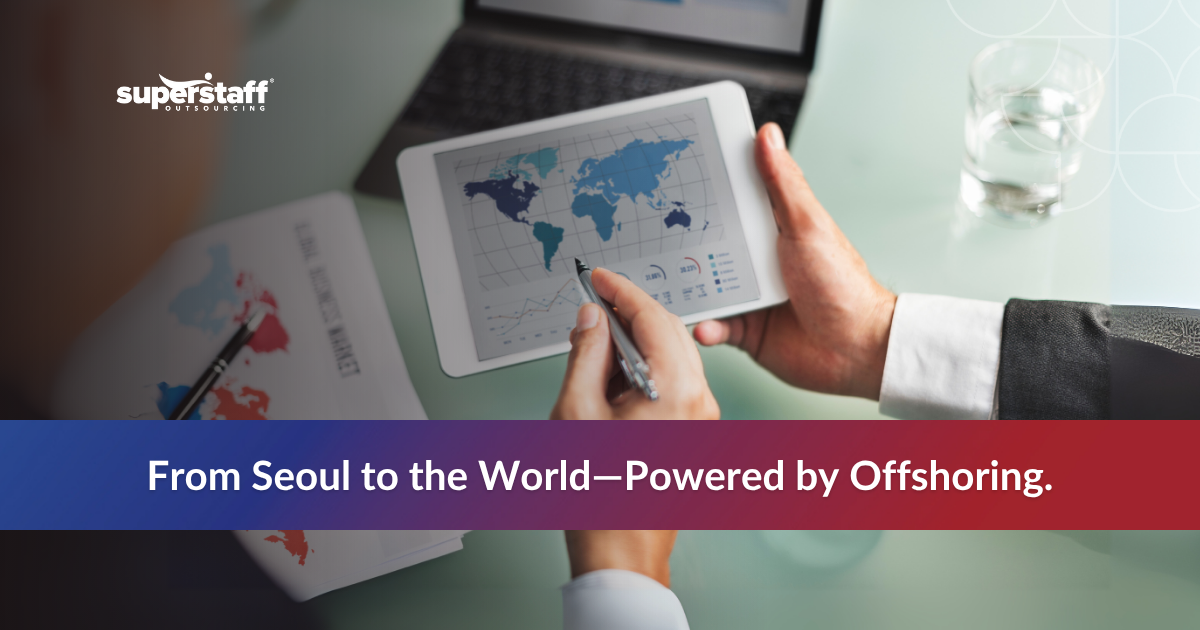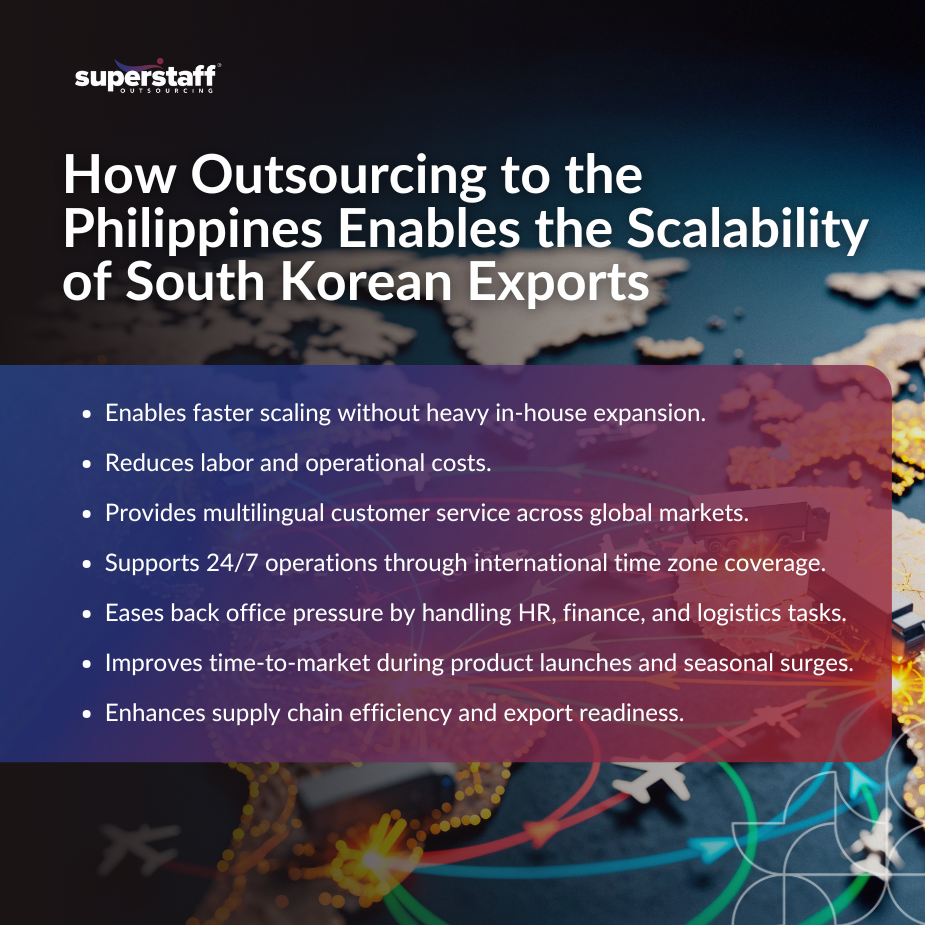
South Korean exports are surging once again, driven by global demand for everything from cutting-edge semiconductors to the latest K-beauty innovations. As Korea cements its position as a global manufacturing and cultural powerhouse, companies are racing to keep up with international orders, scale faster, and maintain high service levels across time zones. But growth at this scale brings challenges—especially when it comes to operational bandwidth, cost management, and supply chain agility.
That’s where offshoring enters the picture. By tapping into nearby outsourcing hubs like the Philippines and other Southeast Asian nations, South Korean firms can extend their capabilities without overextending their internal teams.
In sectors like manufacturing, electronics, automotive, and consumer goods, offshore support teams are stepping in to streamline processes, manage back office functions, and provide multilingual customer experience (CX) and knowledge process outsourcing (KPO) services that power scalability.
In this blog, we’ll examine how strategic offshoring helps South Korean companies meet rising global expectations while staying efficient, resilient, and competitive—at home and abroad.
South Korea’s Export Boom—What’s Driving It?
South Korean exports are gaining renewed strength across multiple industries.
In recent years, South Korea international trade has experienced a strong rebound, driven by innovation, regional partnerships, and a highly adaptive economy. In the first half of 2025, Korea’s exports surged with double-digit growth in key categories like semiconductors, EV batteries, and consumer electronics. Demand for Korean cultural products—from music to skincare—has also contributed significantly to global trade gains.
Several factors are fueling this momentum:
- Government initiatives such as the K-New Deal, which promotes digital and green technology exports.
- Strategic free trade agreements with ASEAN, the United States, and the European Union.
- A shift toward sustainable technologies, with Korean battery manufacturers leading the global push for EV adoption.
Green tech and battery exports are becoming flagship industries, while K-pop’s influence continues to ripple into other sectors such as fashion, cosmetics, and lifestyle products. This cultural halo effect boosts demand in non-tech segments and reinforces brand loyalty globally.
But this growth comes with its challenges. As more orders flow in, companies are under pressure to scale faster, maintain service quality, and manage global customer expectations. It’s no longer just about making world-class products—it’s about delivering world-class service and operations at scale.
Offshoring as a Scalability Solution for South Korean Exports
To keep up with demand, South Korean companies are turning to offshoring for scalable, cost-effective operations.
Managing rapid expansion requires more than just increased headcount—it demands operational flexibility, streamlined workflows, and the ability to scale without increasing fixed costs. That’s where offshoring plays a critical role.
By partnering with offshore service providers, South Korean companies gain access to:
- Skilled support teams to handle customer service, data processing, HR, finance, and more.
- Multilingual CX agents who can handle inquiries from global markets, ensuring brand consistency across borders.
- Back office support to manage order fulfillment, compliance, inventory management, and logistics coordination.
Offshoring also offers elasticity. Unlike in-house expansions that require heavy investment and long lead times, offshore partnerships allow for rapid ramp-up (or downscaling) depending on seasonal demand or market conditions.
For example, during a product launch in North America, a South Korean tech brand can deploy a trained offshore team to handle order tracking, tech support, and warranty management without disrupting its HQ operations.
By reducing bottlenecks in both front-end and backend processes, offshoring gives SK firms the breathing room to focus on innovation and growth—while maintaining excellent customer experiences.

Why Southeast Asia (Especially the Philippines) Is the Offshore Choice
Southeast Asia, led by the Philippines, offers an ideal outsourcing destination for firms handling South Korean exports.
Geographically close and culturally aligned, Southeast Asia has emerged as the region of choice for many South Korean firms looking to offshore operations. Within this region, Philippine outsourcing stands out for its maturity, talent pool, and multilingual capabilities.
Key advantages include:
- Geographic proximity, which enables easier management, collaboration, and business travel.
- English fluency and strong Western cultural alignment, which are essential for global-facing CX.
- A large Korean expatriate community and cultural familiarity, making the Philippines a soft landing for SK brands.
Filipino workers are already providing trilingual support (Korean, English, Tagalog) for various industries. From answering customer queries in Seoul to handling warranty claims from U.S. buyers, Philippine outsourcing teams are proving themselves as capable and culturally sensitive brand ambassadors.
In addition to CX, offshore teams in the Philippines and nearby countries are delivering support in:
- IT development and helpdesk services
- Payroll processing and HR administration
- Accounting and financial analysis
- Legal compliance and documentation review
This well-rounded offering makes Southeast Asia a one-stop shop for companies aiming to scale operations globally without compromising quality.
KPO and Back Office Outsourcing: Strategic, Not Just Supportive
South Korean companies are offshoring not just execution tasks—but strategic functions, too.
While outsourcing once meant handling routine tasks, today’s knowledge process outsourcing goes far deeper. South Korean enterprises are increasingly leveraging KPO to access specialized knowledge, reduce risk, and sharpen their competitive edge.
Examples of strategic offshore functions include:
- Supply chain analytics to forecast demand, optimize routes, and reduce delivery times.
- Regulatory compliance monitoring across international markets.
- Financial planning and forecasting support to inform growth strategies and investment decisions.
These services allow headquarters teams to focus on core activities like product development, market entry, and executive decision-making.
By spreading workloads across a blended team of in-house and offshore professionals, companies can stay agile and avoid overburdening internal teams. This model is particularly beneficial during times of high-volume demand, such as holiday shopping seasons, new market launches, or export surges.
Ultimately, this strategic integration of offshore KPO helps Korean exporters move faster, smarter, and with greater confidence in their operational resilience.
Industry Spotlights—Where Offshoring Creates the Most Impact
Offshoring plays a unique role across the leading sectors fueling the rise of South Korean exports.
Let’s look at how different industries are using offshoring to sustain and scale their export growth:
- Electronics and Tech:
- Offshore teams handle logistics coordination, after-sales tech support, and parts fulfillment.
- Support agents manage product tutorials, warranty claims, and multilingual live chat.
- Automotive:
- Outsourcing powers global customer care, technical documentation, and compliance checks.
- Offshore teams assist in managing dealership networks, service inquiries, and recall notices.
- Consumer Goods and K-beauty:
- Social media monitoring, e-commerce order processing, and returns management are often handled offshore.
- CX agents manage influencer engagement, customer education, and product feedback across regions.
Across these industries, offshoring allows South Korean brands to maintain service consistency at scale. Whether it’s tracking a shipment in Los Angeles or responding to a product review in Singapore, offshore support teams ensure smooth global operations.
Real Benefits: Cost Savings, Speed, and Focus
The results of offshoring are tangible and long-lasting.
South Korean businesses report significant advantages after integrating offshore services into their export operations:
- Cost Savings: Labor costs in the Philippines and other Southeast Asian countries are lower than domestic hiring. These savings allow for reinvestment in R&D and market expansion.
- 24/7 Availability: With offshore teams covering multiple time zones, businesses can offer round-the-clock customer support, speeding up response times and improving satisfaction.
- Faster Market Turnaround: By reducing internal bottlenecks and decentralizing operations, companies can respond quickly to global market trends and execute product rollouts with greater agility.
Moreover, offshoring provides:
- Scalable hiring models, enabling fast team expansions during high-demand periods.
- Leaner internal operations, as HQs shift non-core functions offshore and double down on strategy.
This balance of cost, speed, and strategic focus gives Korean exporters a decisive edge in an increasingly competitive trade landscape.
SuperStaff’s Role in Supporting the Expansion of South Korean Exports
As an outsourcing partner, SuperStaff has the infrastructure and cultural fluency to support Korean companies’ global ambitions.
SuperStaff has helped multiple Asian and Western companies scale their customer experience, back office, and KPO functions—all while maintaining brand integrity and operational excellence.
What makes SuperStaff an ideal partner for South Korean firms?
- Multilingual support, including Korean, English, Japanese, and Spanish.
- Full-service outsourcing capabilities in CX, IT, finance, HR, legal, and data analytics.
- Global office presence, including Southeast Asia and the Americas, ensuring 24/7 coverage.
- Flexible partnership models, tailored to the size and pace of your export goals.
Whether you’re expanding into new territories or managing high-volume seasons, SuperStaff offers the people, processes, and platforms to help you scale smoothly and efficiently.
As South Korean Exports Rise, Offshoring Has Become the Country’s Hidden Advantage
South Korea’s export rise is no longer just about product excellence—it’s about operational scalability, too.
As global demand continues to climb, forward-thinking Korean companies are leaning on offshoring to maintain speed, efficiency, and quality. How offshoring boosts export scalability for South Korean firms lies in its ability to deliver cost-effective talent, mitigate operational risks, and extend service capacity without adding internal stress.
By choosing Philippine outsourcing and other strategic Southeast Asian partners, these companies can focus on innovation while their offshore teams handle the complexity of scale.
SuperStaff stands ready to support your journey—from customer experience to back office and beyond.
Ready to scale your export operations? Talk to SuperStaff about building your offshore support team today.






